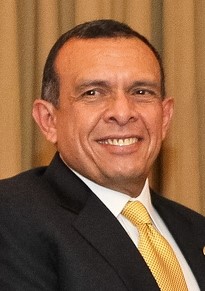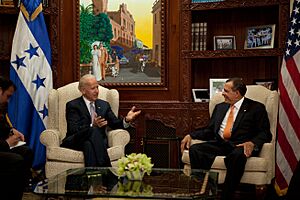Porfirio Lobo Sosa facts for kids
Quick facts for kids
Porfirio Lobo Sosa
|
|
|---|---|

Lobo Sosa in January 2010.
|
|
| 37th President of Honduras | |
| In office 27 January 2010 – 27 January 2014 |
|
| Vice President |
|
| Preceded by | Roberto Micheletti |
| Succeeded by | Juan Orlando Hernández |
| President of the National Congress | |
| In office 25 January 2002 – 25 January 2006 |
|
| Preceded by | Rafael Pineda Ponce |
| Succeeded by | Roberto Micheletti |
| Deputy of the Olancho Department | |
| In office 25 January 1990 – 25 January 2006 |
|
| Personal details | |
| Born | 22 January 1947 Trujillo, Honduras |
| Political party | National Party |
| Spouse | Rosa Elena Bonilla |
| Alma mater |
|
Porfirio Lobo Sosa (born 22 January 1947), also known by his nickname Pepe Lobo, is a politician and farmer from Honduras. He served as the 37th President of Honduras from 2010 to 2014.
Lobo was a member of the National Party, which is a conservative political party. Before becoming president, he was a deputy (a type of representative) in the National Congress of Honduras. He even served as the president of the National Congress from 2002 to 2006.
In 2005, he ran for president but came in second place to Manuel Zelaya. Later, after President Zelaya was removed from power by the military in 2009, Lobo won the next presidential election. He officially became president on 27 January 2010.
Contents
Early Life and Schooling
Porfirio Lobo Sosa was born in the city of Trujillo. He grew up on a ranch near the town of Juticalpa. His father, Porfirio José Lobo López, was also a politician and served in the National Congress.
Lobo went to a Catholic school in Juticalpa and later studied in the capital city, Tegucigalpa. For college, he went to the University of Miami in Florida, where he earned a degree in business.
After college, he returned to Honduras to help with his family's farming business. He also taught subjects like economics and English for 11 years. He later earned a doctorate degree from a university in Moscow, Russia. He also earned a black belt in the martial art of taekwondo.
Political Career
Lobo's interest in politics began when he was just 19 years old. He held several leadership roles in his political party in the Olancho region.
From 1990 to 1994, he was in charge of a government agency for forestry. In 1990, he was elected to the National Congress. He served as the president of the Congress from 2002 to 2006.
Running for President
In 2005, Lobo was the National Party's candidate for president. His campaign focused on creating jobs and having strong laws against crime. He lost the election to Manuel Zelaya of the Liberal Party of Honduras.
In 2009, Honduras went through a major political event. The president at the time, Manuel Zelaya, was removed from office by the military. This is often called a coup d'état.
After this event, a new election was held. Lobo ran for president again and won with 56% of the vote. After his victory, he promised to start a "great national dialogue" to help bring the country together. He also said he would work to create jobs and help the many people in Honduras living in poverty.
President of Honduras (2010-2014)

As president, Lobo Sosa made changes to the country's economic policies. He wanted to encourage more private businesses to invest in Honduras. Some of his changes included new laws for temporary jobs and for how natural resources like water could be used.
His time as president was challenging. Some groups, like Human Rights Watch, reported that it was a difficult time for journalists and people who disagreed with the government. However, the U.S. government, led by President Obama, praised Lobo for trying to bring peace to the country. He created a "truth commission" to study the events that led to the previous president's removal.
During his presidency, there were also serious disagreements between poor farmers and wealthy landowners over who owned certain lands.
One of his government's ideas was a project to create "private cities." These would be special areas where investors would have more control. The plan was approved by the government but was later stopped by the country's highest court, which said it was unconstitutional.
By 2012, polls showed that President Lobo was not very popular. His presidency ended at a time when Honduras faced major problems with crime and poverty.
Later Life
After his presidency, Lobo and his family faced public questions about their finances. In 2018, his wife, Rosa Elena Bonilla, was investigated for how she used government money when she was the first lady.
In 2019, the brother of the next president, Juan Orlando Hernández, was on trial in the United States. During the trial, there were claims that money from illegal activities was used to help fund the election campaigns of both Lobo and Hernández.
In 2021, Lobo's name appeared in the Pandora Papers. This was a large leak of financial documents that showed how many world leaders used companies in other countries to manage their money.
See also
 In Spanish: Porfirio Lobo para niños
In Spanish: Porfirio Lobo para niños
- Honduran Social Security Institute

